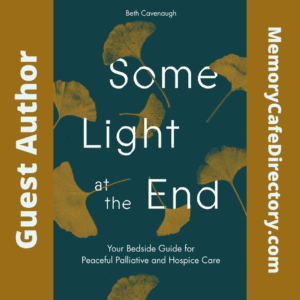Memory Cafe Directory posts and/or links to retailers can be advertising, sponsored, or affiliate links. We may earn a small commission from them. Thank you.
Some Light at the End
By Beth Cavenaugh
Hospice 101: When Caring for a Love One Living with Dementia
At age 23, I worked at an adult day care where we cared for patients living with chronic illnesses. The majority of our residents had dementia. We opened at 8:00 AM, and spouses or family members would drop off their loved ones so they could go to work or manage their own health care appointments.
We offered snacks, lunch, and activities that included dancing, reminiscence, memory games, and physical exercise. We gave them their medications and tried to redirect them when they became agitated. We helped them to the bathroom and often had to change their clothes.
I was grossly underqualified for this position, but I could dance an adequate polka.
The family members would pick them up at 5:00 PM or so; as they would walk over the threshold of the doorway, I remember feeling like I had gotten hit repeatedly by a train for eight hours. I saluted these family members as saints and angels as they gently guided their loved one into the car to take them back home — grateful that I did not have to worry about my patients 24/7.
I simply took care of them for eight hours in a locked facility where we had all sorts of controls and paid people to play piano and do the laundry.
Honored and Seen
First off, I honor you, I bow to you, and I see you. Caring for a loved one with dementia is a heart wrenching and exhausting task, intermingled with beauty and unconditional love. Almost 30 years later, I am a hospice nurse and often care for patients living with and dying from dementia.
Because dementia progresses slowly, it may be hard to know when your loved one could benefit from hospice support. Here are some things to consider as you determine how to make decisions for your loved one.
Consider the last six months of your loved one’s life. Getting a broader perspective can help us to see with more clarity.
- Have they physically declined?
- How is their ability to walk, talk, swallow, smile, sit?
- How is their quality of life?
- Are they constantly being treated for delirium and urinary tract infections?
- Are they distressed more often than not?
- Have you been to the emergency department more than the grocery store?
Palliative Care Always Appropriate
Inquire about palliative care support at any time. You can call their primary doctor at any time to inquire about palliative care support. A palliative care team offers symptom management and decision-making guidance for patients living with chronic conditions. Dementia is a chronic condition that often has behavioral and physical changes which could benefit from ongoing medical guidance.
Palliative care is an excellent resource because they are always considering goals of care.
- What are the patient’s goals?
- What would they want?
- Will this treatment be more harmful or beneficial?
- Will it improve the quality of their life?
When you care for a loved one living with dementia, a palliative care team can guide you and support you as you make choices about your loved one’s health and well-being.
Learn About Hospice Any Time
Inquire about hospice support any time. Hospice support is medical, emotional, and spiritual support for the patient and family when a patient is expected to die in the next six months without any aggressive medical intervention or treatment.
You can ask your loved one’s primary doctor about hospice support at any time, and if it is appropriate, they can refer you to a hospice. Or you can call any hospice in your area to ask for an informational visit. A hospice nurse will come to your home and provide information about hospice services. You can then ask specific questions about your loved one.
Must Qualify for Hospice Care
A person has to qualify for hospice based on strict criteria. Two doctors must verify that your loved one likely has six months or less to live if they let the disease run its course.
The doctors will review the patient’s full health history, their recent hospitalizations, their current infections, and their overall physical decline to make this determination. Oftentimes, a patient living with dementia may qualify for hospice when their disease has progressed so far they cannot walk unassisted, cannot sit unsupported, cannot say more than six intelligible words in a day, and are unable to smile. But, because the criteria are so specific and each person is so different, the doctors will make this determination.
Caregiving is Tough
Making healthcare decisions for someone you love is fraught with emotional turmoil. I know I don’t need to tell you this, you are living it. In our medical system, there is almost always some type of life-prolonging medical intervention offered for the infection, a surgical procedure when your loved one cannot swallow, a chemo for cancer, or an antibiotic for an infection.
The weight of declining a treatment is enormous. A hospice or palliative care team can help to support you as you make these decisions for your loved one by evaluating the benefits and burdens of treatment and the quality of life for your loved one.
Take a breath, take a break, take a nap. Caregiver syndrome is a real and rising crisis. When you take care of yourself, you can take better care of someone else, you can see more clearly, you have more equanimity, and you are valuing your life as well as your loved ones.
Caring for a loved one living with dementia is 24/7 love and labor, and making health care decisions for your loved one is fraught with emotional turmoil. If you are wondering when your loved one would benefit from hospice support, gather some information, and ask for some medical guidance from a palliative care team or hospice team.
We make decisions based on all the information we have at that moment, and we are all doing the best we can, one step at a time.
Beth Cavenaugh, RN, BSN, CHPN

Beth Cavenaugh
Beth Cavenaugh is a certified hospice and palliative care nurse, Reiki practitioner, and educator with over 14 years of experience in caring for patients at the end of their life. Compassion, patient autonomy, and transparent communication are the core of her care philosophy.
Beth demystifies death and dying so this powerful moment will be embraced as a normalized and celebrated life event.
Learn more at BethCavenaugh.com.
Be our next Guest Author!
Read more Guest Author stories or
learn how you can be a Guest Author
here on Memory Cafe Directory.






